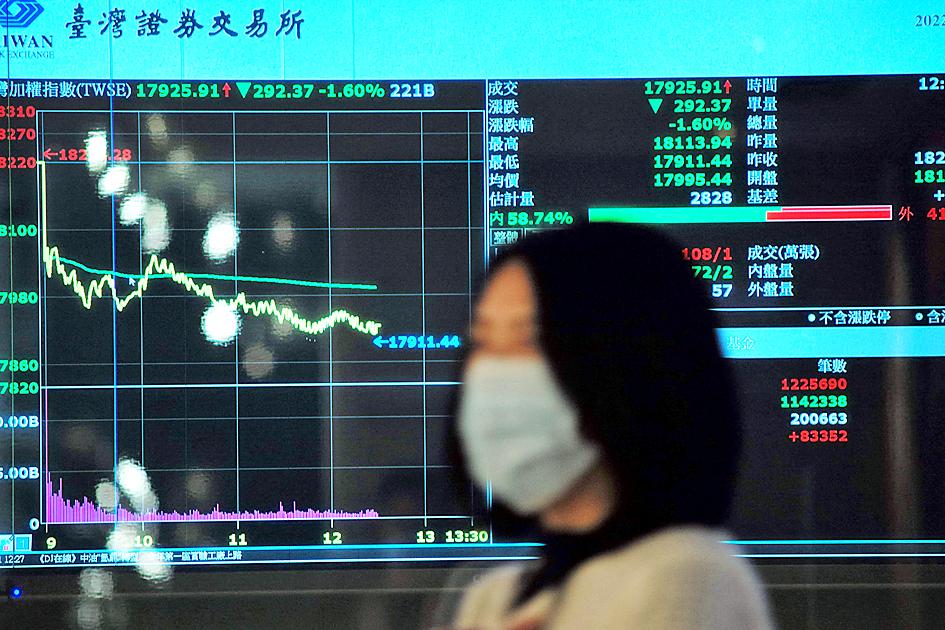Taiwanese shares took a beating yesterday as the benchmark TAIEX fell to its lowest point in almost one year, as market worries remained over planned rate hikes by the US Federal Reserve, dealers said.
The bellwether electronics sector continued its downtrend, led by large-cap semiconductor stocks, while the financial sector saw a sell-off as investors rushed to downsize their portfolios amid market volatility, they said.
The TAIEX at its close was down 359.28 points, or 2.19 percent, at the day’s low of 16,048.92. Turnover totaled NT$239.82 billion (US$8.07 billion), with foreign institutional investors selling a net NT$21.15 billion of shares on the main board, Taiwan Stock Exchange (TWSE) data showed.

Photo by Sam Yeh / AFP
Yesterday’s closing level was the lowest since May 20 last year, when the TAIEX ended at 16,042.36, TWSE data showed.
“While US Federal Reserve Chair Jerome Powell has ruled out an increase of 75 basis points in each of the upcoming policymaking meetings, the rate hike cycle has been put in place, and many investors at home and abroad are increasingly worried about liquidity being drained from the market,” MasterLink Securities Corp (元富證券) analyst Tom Tang (湯忠謙) said.
The Fed raised its key interest rate by 50 basis points in a meeting held last week after a 25 basis point increase in March in an attempt to tackle inflation.
“In Taipei, investors stayed jittery about the US markets’ performance, so they simply scrambled to further unload their holdings. Today, massive selling was seen among financial stocks, having spread from their tech counterparts,” Tang said.
The financial sector closed down by 3.4 percent, and the electronics sector fell by 1.72 percent overall, with the semiconductor subindex declining by 1.78 percent, and the transportation sector, which includes major shipping and airline stocks, declined 3.53 percent, TWSE data showed.
“Today’s turnover remained low, as many investors were reluctant to buy during the dips since they fear more losses down the road,” Tang said. “The market also remains alert to the impact on the economy from COVID-19 lockdowns in China.”

RUN IT BACK: A succesful first project working with hyperscalers to design chips encouraged MediaTek to start a second project, aiming to hit stride in 2028 MediaTek Inc (聯發科), the world’s biggest smartphone chip supplier, yesterday said it is engaging a second hyperscaler to help design artificial intelligence (AI) accelerators used in data centers following a similar project expected to generate revenue streams soon. The first AI accelerator project is to bring in US$1 billion revenue next year and several billion US dollars more in 2027, MediaTek chief executive officer Rick Tsai (蔡力行) told a virtual investor conference yesterday. The second AI accelerator project is expected to contribute to revenue beginning in 2028, Tsai said. MediaTek yesterday raised its revenue forecast for the global AI accelerator used

TEMPORARY TRUCE: China has made concessions to ease rare earth trade controls, among others, while Washington holds fire on a 100% tariff on all Chinese goods China is effectively suspending implementation of additional export controls on rare earth metals and terminating investigations targeting US companies in the semiconductor supply chain, the White House announced. The White House on Saturday issued a fact sheet outlining some details of the trade pact agreed to earlier in the week by US President Donald Trump and Chinese President Xi Jinping (習近平) that aimed to ease tensions between the world’s two largest economies. Under the deal, China is to issue general licenses valid for exports of rare earths, gallium, germanium, antimony and graphite “for the benefit of US end users and their suppliers

Dutch chipmaker Nexperia BV’s China unit yesterday said that it had established sufficient inventories of finished goods and works-in-progress, and that its supply chain remained secure and stable after its parent halted wafer supplies. The Dutch company suspended supplies of wafers to its Chinese assembly plant a week ago, calling it “a direct consequence of the local management’s recent failure to comply with the agreed contractual payment terms,” Reuters reported on Friday last week. Its China unit called Nexperia’s suspension “unilateral” and “extremely irresponsible,” adding that the Dutch parent’s claim about contractual payment was “misleading and highly deceptive,” according to a statement

Artificial intelligence (AI) giant Nvidia Corp’s most advanced chips would be reserved for US companies and kept out of China and other countries, US President Donald Trump said. During an interview that aired on Sunday on CBS’ 60 Minutes program and in comments to reporters aboard Air Force One, Trump said only US customers should have access to the top-end Blackwell chips offered by Nvidia, the world’s most valuable company by market capitalization. “The most advanced, we will not let anybody have them other than the United States,” he told CBS, echoing remarks made earlier to reporters as he returned to Washington